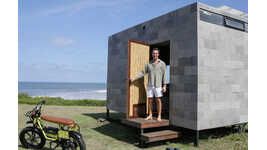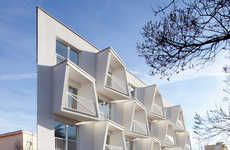
This Concept Skyscraper Will Be Built Using Residents' Recycled Waste
Rahul Kalvapalle — July 8, 2014 — Eco
References: chartier-corbasson.tumblr & gizmag
French architectural practice Chartier-Corbasson has envisioned an incredible skyscraper, dubbed the Organic London Skyscraper, that will be built from the recycled waste of its own occupants.
The architects propose that paper and plastic waste generated by the building's tenants could be recycled and used to create panels for the building's continued construction. The Organic London Skyscraper building would then 'grow' thanks to the waste generated by its residents, with enough materials being produced within one year to create the building's facade.
The building is also designed to be efficiently and cost-effectively operable, in that waste materials can be collected and sorted within the building itself, before being converted into construction panels. The quicker vacant spaces in the building are occupied, the quicker construction would be completed thanks to the increased amount of waste produced.
The architects propose that paper and plastic waste generated by the building's tenants could be recycled and used to create panels for the building's continued construction. The Organic London Skyscraper building would then 'grow' thanks to the waste generated by its residents, with enough materials being produced within one year to create the building's facade.
The building is also designed to be efficiently and cost-effectively operable, in that waste materials can be collected and sorted within the building itself, before being converted into construction panels. The quicker vacant spaces in the building are occupied, the quicker construction would be completed thanks to the increased amount of waste produced.
Trend Themes
1. Recycled Waste Construction - The concept of recycling building materials to construct new buildings, potentially revolutionizing construction waste management and reducing environmental impact.
2. Circular Skyscrapers - The idea of designing buildings that function as closed-loop systems, where waste is minimized and materials are reused as part of a circular economy.
3. Smart Waste Management Buildings - The use of technology and innovative processes to turn waste into resources in buildings, creating larger opportunities for sustainable construction.
Industry Implications
1. Architecture - Opportunities for architects and builders to focus on creating sustainable structures with a lower environmental impact and utilizing waste materials for construction.
2. Recycling and Waste Management - The potential to create new businesses and technologies in waste management, recycling, and repurposing of building materials.
3. Smart Cities - The potential for waste management innovation within urban development projects geared towards sustainability and resource management.
5.2
Score
Popularity
Activity
Freshness























